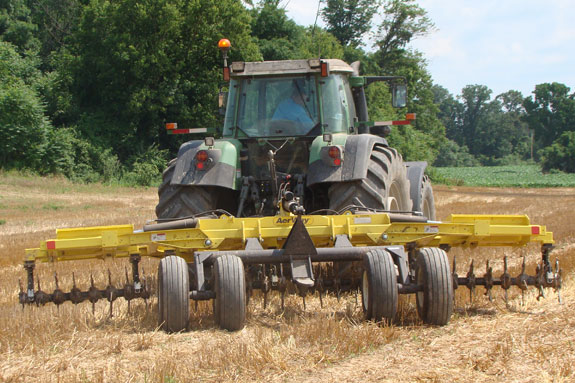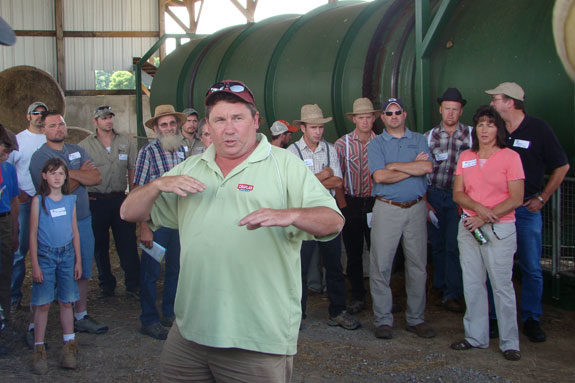Manure Happens was a field day held on June 25, 2010 at Mains Dairy in Cumberland County, Pennsylvania. This event was all about using nature’s free fertilizer responsibly. Approximately 100 people were in attendance including the speakers and industry sponsors. The day began with a presentation by Dr. Doug Beegle of the Pennsylvania State University.
He talked about “The Chesapeake Bay and Using Manure Responsibly.” As nutrient regulations change in Pennsylvania, Dr. Beegle keeps the ag community informed on the changes and ways to be more responsible with ones nutrients.
Following Dr. Beegle’s talk, the guests were given a tour of the dairy’s manure separator, solids composter, and digester. The Mains Dairy consists of about 900 milking cows, plus heifers and calves. The milking herd manure is separated into solids and liquids. The solids are composted for two days in a large composting drum.
Once the process is complete, these solids are odor free and sterilized. Mains Dairy uses the composted solids for bedding. In addition they sell extra composted solids to other farms for use as bedding. These composted solids are very friendly to a dairy system. They are free of odor, non-abrasive to equipment, and promote superior udder health.
The liquids are mixed with whey (a bi-product of the cheese making industry) and put into the digester. Here specific bacteria digest various nutrients in the liquid and produce methane gas. The methane gas is burned off to produce electricity.
After the tour, various manure application equipment were demonstrated. All equipment demonstrated focused on nutrient conservation. Two different liquid manure spreaders with attached injectors applied liquid manure to the field. One dry manure spreader was demonstrated. This spreader is equipped with GPS and a scale, which can monitor the amount of material being applied and vary it depending on the needs of the field.

Also an Aerway was demonstrated. This is a piece of equipment that basically “pokes” holes in the ground, then liquid manure is applied on top of the ground and sinks into the holes.
After a delicious hot lunch, the guests listened to various talks. Leroy Bupp, a long time No-till Dairy farmer from York County, and Dave McLaughlin, a long time no-till dairy farmer from Perry County, discussed the different ways they use manure on their farms.
Robb Meinen from the Pennsylvania State University discussed the new Pennsylvania Odor Regulations and how they impact the farm. Justin Dillon also from the Pennsylvania State University talked about current products that are on the market to help stabilize nitrogen.
A mid-afternoon break was sponsored by the Cumberland County Dairy Princess Program. The dairy princess, Star Leonard, and dairy maid Rachel Cohick dished out delicious ice-cream for all in attendance.
Following the afternoon break, Jeff Ainslie from Red Barn Consulting discussed ways to use available funding for various farm projects. John Bell from the Pennsylvania Farm Bureau ended the day with a talk about the Laws Governing Farm Transportation of Manure.
Information and photos provided by Genevieve Christ with Penn State Cooperative Extension in Cumberland County. You can learn more about Genevieve at her blog http://pafarmgirl.wordpress.com/ or on Twitter at @ PAfarmgirl .




